My reading this month was wide ranging and quite satisfying, with plenty of excellent books to recommend. Let’s get to those reviews!
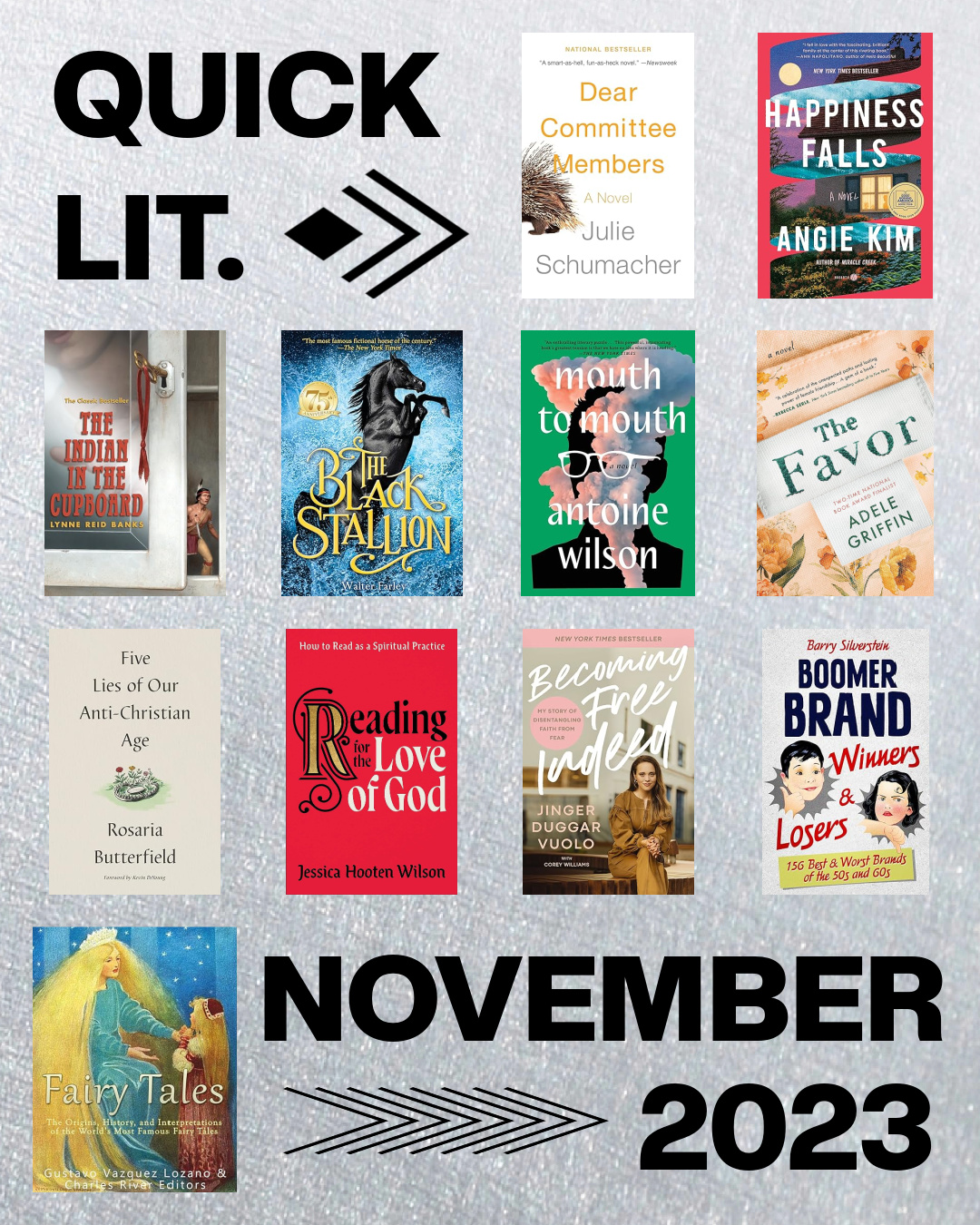
The Indian in the Cupboard, by Lynne Reid Banks Omri’s birthday gets off to a disappointing start when his best friend Patrick gives him nothing but a castoff Indian figurine as a present. But it quickly becomes a birthday to remember when Omri places the figurine in an old metal cupboard, reopening it the next day to discover the Indian has come to life! Omri and his tiny warrior, Little Bear, soon form a cautious friendship, but keeping Little Bear hidden from Patrick, his brothers, and his teachers proves difficult. Then a cowboy figurine named Boone is also brought to life, setting the scene for mayhem and animosity the likes of which Omri’s bedroom has never seen!
I remember LOVING this book as a child! My own stuffed animals and dolls were very much alive for me (even into my adolescence), and I enjoyed seeing the figurines of this series ACTUALLY brought to life (long before Toy Story made lifelike toys a household staple). As with so many childhood favorites, this reads a little differently as an adult. The magic is still there, but I was uncomfortable with the dated (and unfavorable) portrayal of the Iroquois warrior and had SO MANY questions about the nature of the fantasy elements that I wish were explained further in the text.
Digging a little deeper, there are some discussable themes of responsibility, secrecy (when is it healthy and when these secrets can become destructive), human dignity, friendship, loyalty, and expectations. There are also some fun cultural elements to explore, thanks to the 1980 British setting and the historical figurines who reference their lives in nineteenth century America. Best of all, my kids all liked this one a lot.
My Rating: 4 Stars // Charleston’s Rating: 4.5 Stars // Book Format: Print
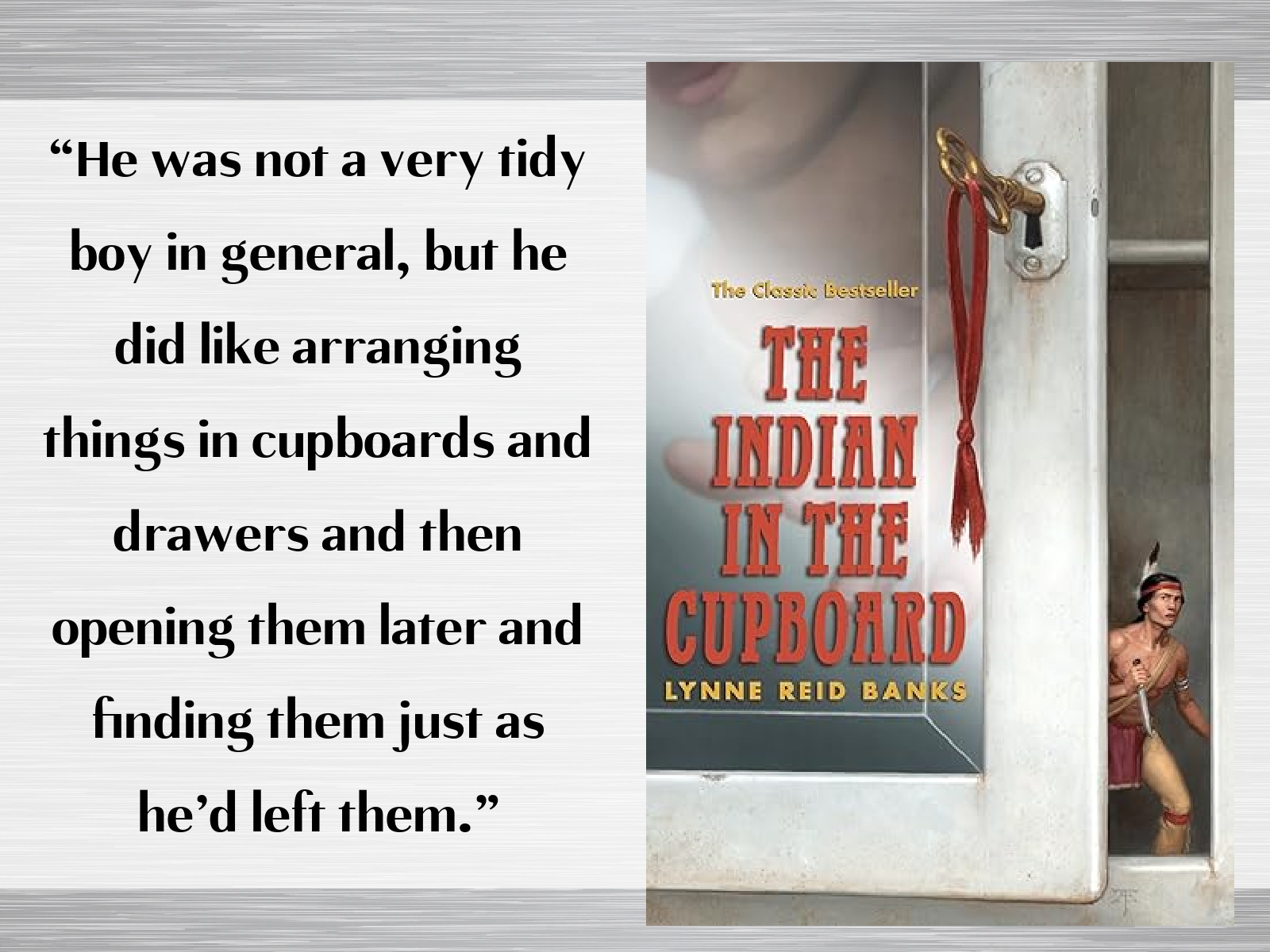
The Black Stallion, by Walter Farley: When a storm leaves young Alec Ramsay shipwrecked on a desert island, he has no hope but to rely on the only other survivor: a beautiful but seemingly untamable black stallion. Alec and the Black soon form a bond, and when the two are miraculously rescued, it marks the start of a new life for both of them.
This book checks off all the boxes for iconic boys’ adventure story: a perilous journey, survival in the wilderness, unexpected friendship, an admirable young hero, a remarkable animal, and of course some fierce competition. The story is a little thin and there’s not much in the way of character development, but I enjoyed the classic themes of resilience, courage, hard work, and loyalty, and I appreciate stories that offer young boys such strong (albeit unrealistic) role models.
Published in 1941, this portrays a very different world—one in which young people held different roles and responsibilities, where teens were more mature but less worldly. We can’t return to those days, but I am always grateful for the chance to visit them with my kids through books. Charleston was not especially invested in this story, but I enjoyed seeing him light up at certain parts and I definitely saw him connecting to the character of Alec, reminding me that timeless stories like these are always worthwhile read-alouds.
My Rating: 3.5 Stars (Rounded to 3 Stars on Goodreads) // Charleston’s Rating: 3.75 Stars // Book Format: Print
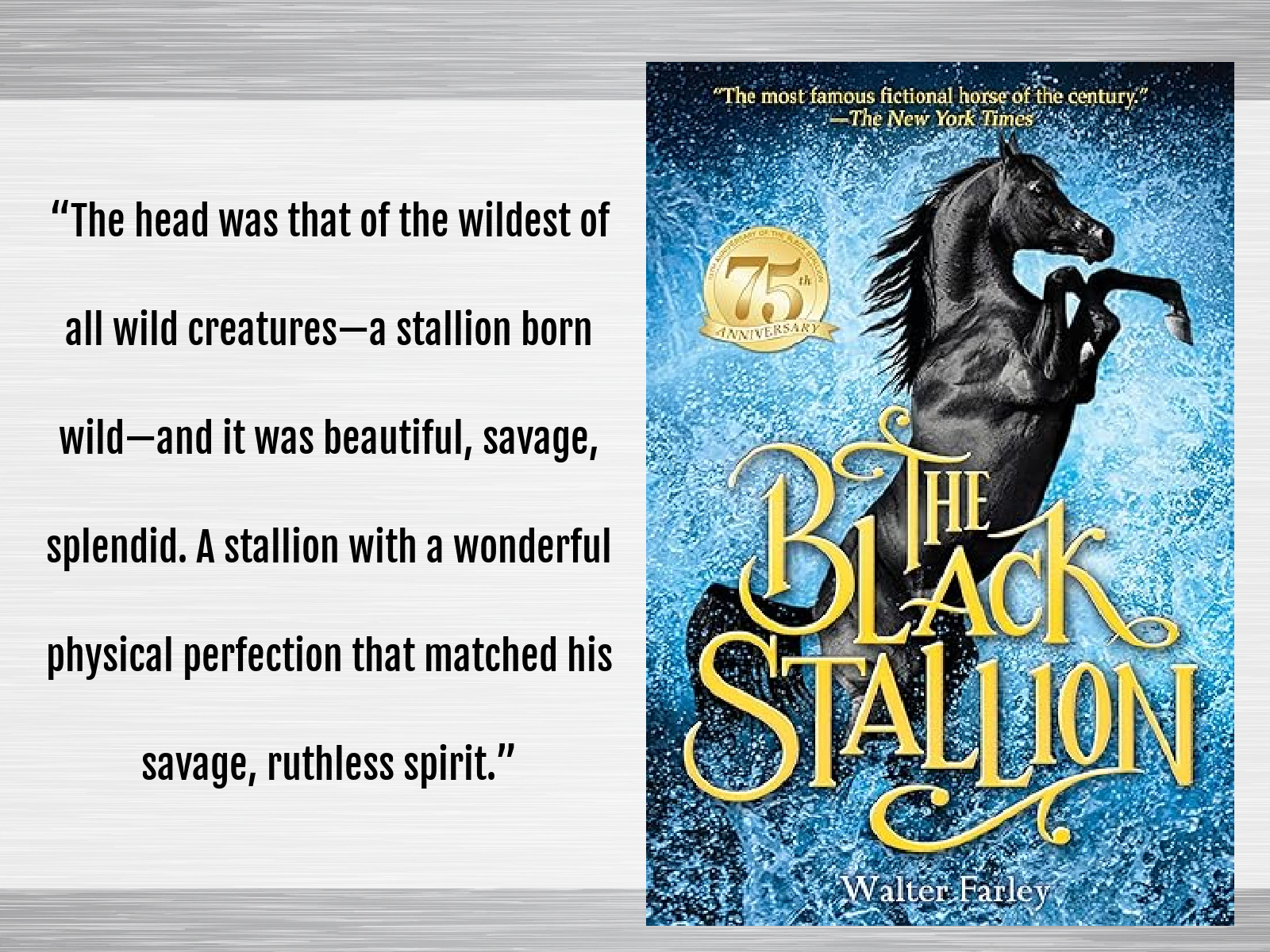
The Favor, by Adele Griffin: Nora Hammond’s work at I’ll Have Seconds (a clothing boutique where she leans into her expertise in vintage fashion to pair high-end pieces with the store’s elite clientele) is a bright spot in a life that hasn’t been easy. After losing her mother at a young age, Nora always longed to be a parent herself; now in her late thirties, Nora and her husband Jacob are drowning in debt and marital woes thanks to years of unsuccessful IVF. But Nora’s fortunes seem to change when a confident socialite named Evelyn Elliot walks into I’ll Have Seconds, swooping up half the store’s inventory and forming an instant bond with Nora, the “big sister” Evelyn always wanted.
Soon Nora is wrapped up in Evelyn’s high end lifestyle, unable to keep up but also not sure of how to turn down Evelyn’s generous gifts and seemingly altruistic friendship. When Evelyn suggests she carry a baby for Nora and Jacob, they reluctantly agree to the surrogacy. But the couple grows uncomfortable as Evelyn starts capitalizing on the pregnancy for social media purposes, and when Evelyn slowly cuts Nora and Jacob out of her life, they are left wondering if Evelyn truly intends to make good on this favor of a lifetime.
I’ve struggled reading about infertility in the past, but after hearing Adele Griffin share her personal experience with infertility and surrogacy in an author interview, I was intrigued and tentatively picked up a library copy to sample. The story sucked me in from page one and I could barely put this down until I’d reached the (intensely satisfying) final page. The Favor grapples with incredibly difficult issues (namely infertility and the complicated nature of surrogacy, but also parental loss, marital discord, friendship challenges, financial struggles, the complexities of social media, and much more), but these are handled with compassion and delicacy. Griffin does not sugarcoat the hardness of these situations, but she doesn’t play up the trauma factor either.
A book like this one could come across as either dismissive of hardship or wallowing in grief, but the tone of The Favor acknowledges genuine pain while remaining optimistic that such pain can be negotiated in a healthy, mature way. The hard parts of the novel are cushioned by lovely human connections (I was especially drawn to the realistic but admirable bonds that Nora has with her husband and with her best friend), and we see how infertility and other unmet expectations can wound close relationships without destroying them, something I found hopeful and encouraging.
The dynamic between Nora and Evelyn is a complicated one that evoked plenty of feelings (mostly negative ones towards Evelyn for the ways she unfairly manipulates her wealth and power, but also frustration with Nora for being complicit in Evelyn’s unhealthy behavior); ultimately, I enjoyed reading about their strange friendship/partnership even though it is a connection I would personally flee! I also enjoyed the fashion elements: I have zero understanding of fashion (especially high-end classic styles), but found the outfit descriptions alluring and frequently paused my reading to Google the vintage items described.
As much as I enjoyed this, I felt the story could have been more streamlined: I struggled to keep up with the ever-growing cast list, and the pacing is uneven. The tone is also a little young given the age of the protagonists (although this made more sense to me once I learned that Adele Griffen has written exclusively YA in the past). But if you are looking for a book with a unique premise and a story that will challenge your understanding of friendship and family, you will absolutely find that here.
My Rating: 4 Stars // Book Format: Kindle
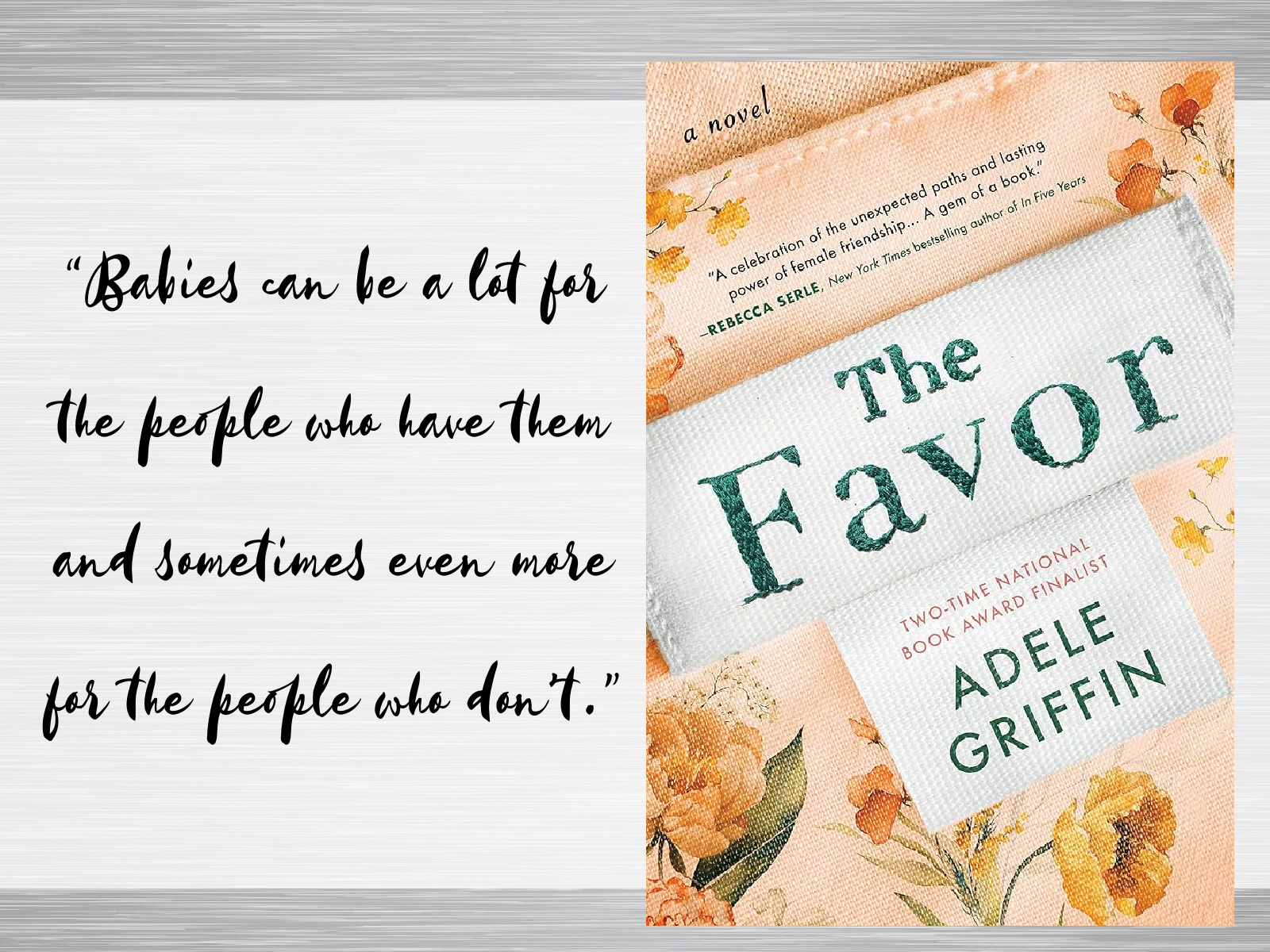
Happiness Falls, by Angie Kim: In June of 2020, twenty-year-old Mia—the brilliant, irreverent, and highly analytical narrator of our story—and her twin brother, John, are riding out the Covid pandemic in their Virginia home with their flawed but tight-knit biracial Korean American family. When their beloved father goes missing during an afternoon in a nearby park, Mia is certain there must be a plausible explanation; but what begins as an apparent misunderstanding quickly devolves into a harrowing investigation replete with family drama, frustrating Covid protocols, confusing timelines, and too many missing puzzle pieces. Most frustrating of all is that there IS someone who likely knows his father’s whereabouts, but 14-year-old Eugene has a rare combination of genetic disorders that prevent him from speaking or communicating what he knows.
At its surface, this is a fairly straightforward mystery, but as the investigation unfolds, Mia takes us back through the weeks, months, and years leading up to the disappearance. We get to know this family, seeing them through marital struggles, sibling rivalry, and the difficulties faced by biracial families and families of individuals with disabilities. Folded into the story are the family members’ various specialities and interests as Kim incorporates elements of music theory, psychology (particularly the psychology of happiness), language studies, speech therapy, multiculturalism, and (my personal favorite) the unique dynamic between boy/girl twins. (The connection between Mia and John is fascinating, and I see so much of my own twins in them!) There is a LOT going on here, but instead of feeling like a kitchen sink of issues, this reads as a realistic family navigating complex/unusual—but entirely believable—issues, and learning to work with and through their challenges while maintaining strong family bonds.
This is a very voicey novel, and Mia’s snarky, know-it-all narration maintains the narrative drive, providing an element of suspense (with plenty of ominous hints at what is to come) while tying the family history, scientific findings, and personal reflection into the overarching mystery. I especially enjoyed the longwinded footnotes in which Mia offers her unfiltered opinions on everything from racism to teen angst. Mia is smart and insightful, but also somewhat immature in a way some readers might find grating but that I found believable and endearing.
Its name notwithstanding, Happiness Falls is not an especially happy book, but there are plenty of redemptive moments, most notably the family’s fierce love and loyalty to one another. It is also a treasure trove of information about topics that were not on my radar, yet had me riveted! I love books that have something to teach me, and I learned so much here about happiness, mindset, and most of all about how we perceive and possibly underestimate individuals we can’t understand. It’s no exaggeration to say that I will never perceive an individual with neurodivergence or other disability in the same way after reading this book.
With its impeccably executed merging of mystery, family story, complex characters, and unconventional themes, this has easily landed a spot on my Top 5 books of the year. If you pick this one up, be sure to read through the Author’s Note, and Sarah’s interview with Angie Kim is not to be missed (but listen after reading as it contains slight spoilers).
My Rating: 5 Stars // Book Format: Kindle
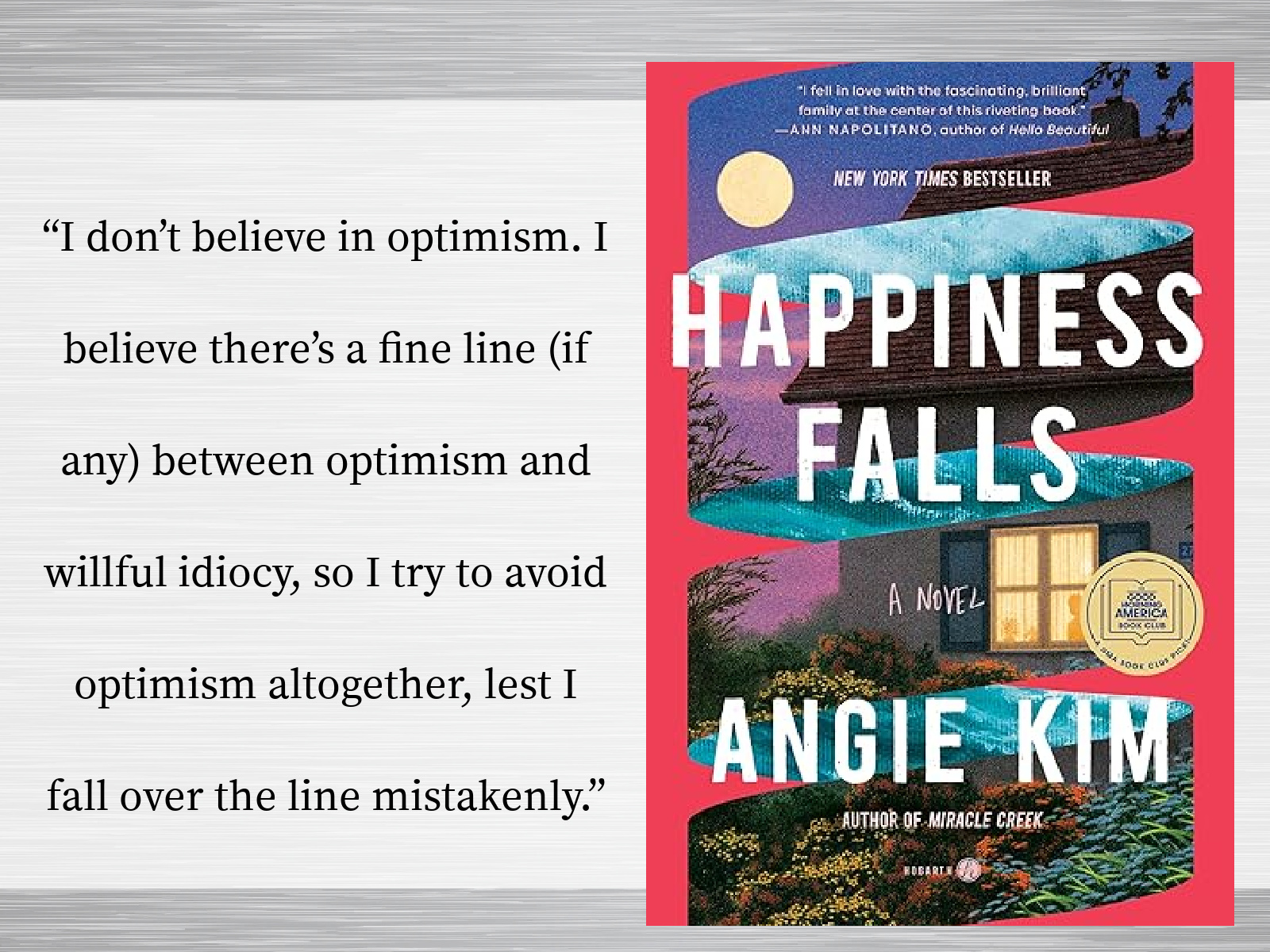
Dear Committee Members, by Julie Schumacher:
Dear Reader,
It has come to my attention that you are seeking a smart, humorous book to fill your reading hours, and for this purpose I am pleased to heartily endorse Dear Committee Members for the position.
Please be advised that this candidate, though intelligently written and abounding with satirical humor, will not be to everyone’s taste. Composed entirely of letters of recommendation from an opinionated and highly disgruntled English professor named Jason Fitger, this is best suited for readers who will appreciate an academic setting and its inherent politics, drama, and in-house frustrations. Fitger is curmudgeonly and prone to rabbit trails*, unafraid of mixing personal grievances and nods to his romantic entanglements and frustrations about his floundering authorial career into his snarky recommendations (and in many instances, NON-recomendations). Fitger is an unapologetic luddite and ruthless judge of character, though the occasional soft side does make an appearance as is seen in his deep care for his students’ welfare and sentimental longing for past lovers.
Reader, you may recall my past recommendations of other epistolary tomes and my love for this format. Understand that this book stands apart from others like it in that it is less endearing than many books of this micro genre, and at moments becomes rather tedious**. And yet, if it is heart you are seeking, you will not be disappointed, as moments of tenderness make sporadic appearances, culminating in a surprising tearjerker ending.
It is with these small reservations that I submit this unique title for your consideration. I may also recommend that you procure the use of a dictionary while reading, as the vocabulary is expansive and suitably academic. Also have pen and quill handy should you be inspired to begin compiling your own surfeit of Letters of Recommendation.
In Humor and Bibliophilic Love,
Kendra Jernejcic, Book Reviewer
P.S. I hope this unique review format will be appreciated—though it might be offputting to those who have not read the book. To that, I have no comment other than a mild disappointment with those who fail to take quality reviews and a love of literature to heart.
*Though I must say every letter could benefit from a good trail-following footnote.
**This tediousness could have been avoided through a different approach: namely, reading a few letters at a time rather than consuming the 200-page book in a couple of sittings.
My Rating: 4.5 Stars (Rounded to 4 Stars on Goodreads) // Book Format: Kindle
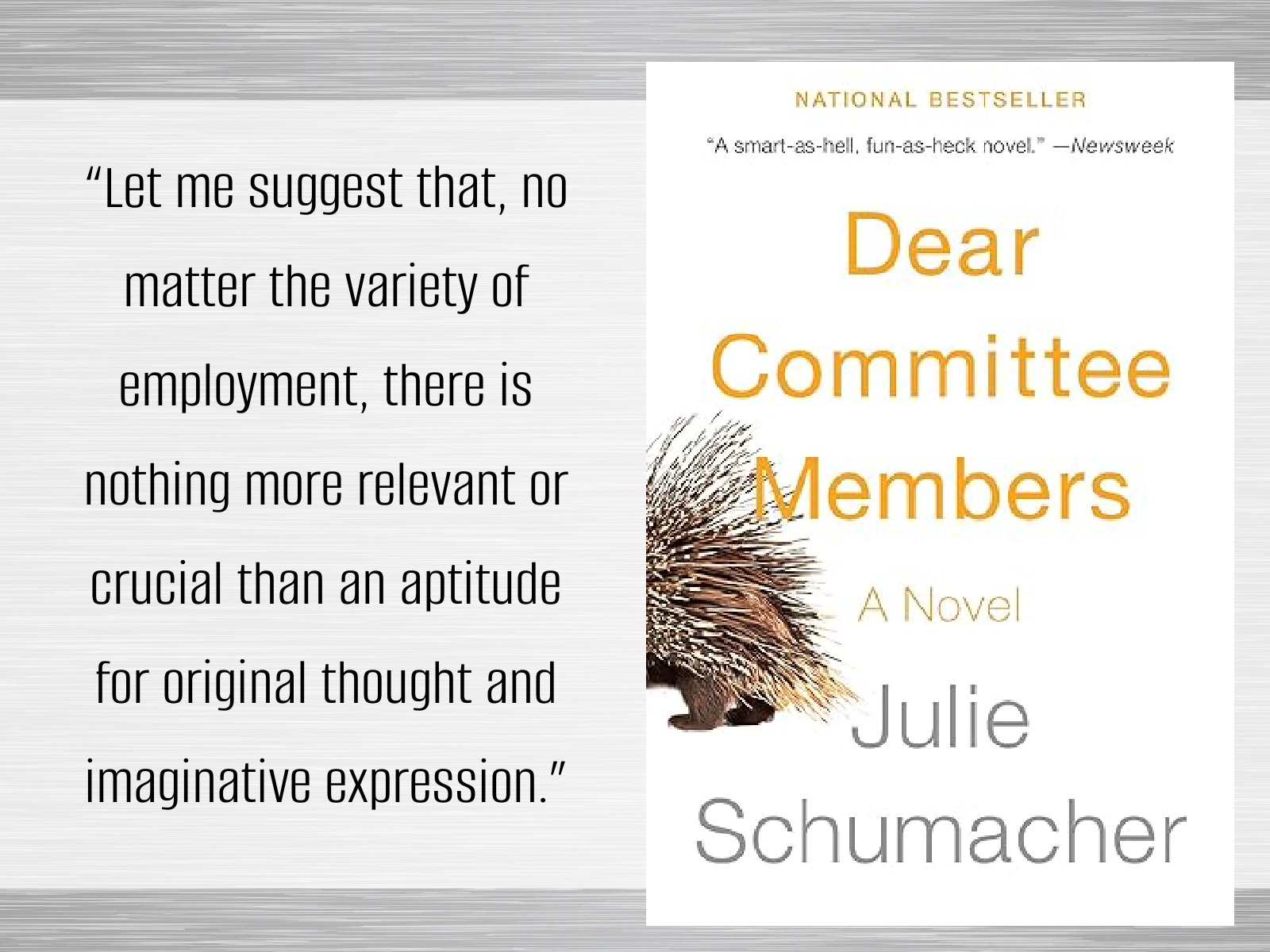
Mouth to Mouth, by Antoine Wilson: Awaiting a delayed flight at JFK airport, our unnamed narrator hears a familiar name come across the loudspeaker. Jeff Cook is a fellow UCLA alum whom the narrator has not seen or even thought about in decades. Though they were barely acquaintances in school, the two share a warm reintroduction and Jeff—who has clearly grown accustomed to luxury and prestige in the years since graduation—invites the narrator to join him in the First Class Lounge, where our narrator becomes Jeff’s inadvertent confessor as this near-stranger shares a long-ago incident on a beach when he resuscitated a drowning man. Traumatized by the event and eager to know what had become of the rescued individual, Jeff soon discovered that the rescued man was a successful art dealer with a sharklike reputation. Jeff found himself swept into the art world, and whether by fate or impetus, the lives of these two men slowly intertwined.
This is a compelling examination of life’s biggest questions: how much agency do we have over our own stories? What do we owe those who save or shape our lives? Who are we apart from the stories we tell ourselves and the selves we show to others? These ideas are explored, but never answered, within the unique framework of this fable-like story whose characters—due to the secondhand nature of the storytelling—are difficult to know, but whose stories and motives are utterly captivating.
I have little understanding of the art world, and I was intrigued by the insights into the gallery setting and its complexities (particularly the frequent immorality and illegal shenanigans inherent in this world). I was especially drawn to the descriptions of specific paintings that provide a framework for understanding the individuals and underlying themes within the book.
This is described as a thriller, and though the tone is subtly suspenseful I found that categorization misleading. This is more of a thinking and processing book than one filled with action, though the pages do fly by. At just under two hundred pages, this is a very fast read that manages to convey so much in just the right amount of space.
The sentence-level writing in this brief novel is exquisite, and the book is brimming with unique philosophical quotes. Though the ambiguous ending and stoic narration may be off-putting to some readers, I found these to be highlights. Though I have not seen comparisons to The Great Gatsby, I could not stop thinking of the numerous parallels as I read.
My Rating: 4 Stars // Book Format: Kindle
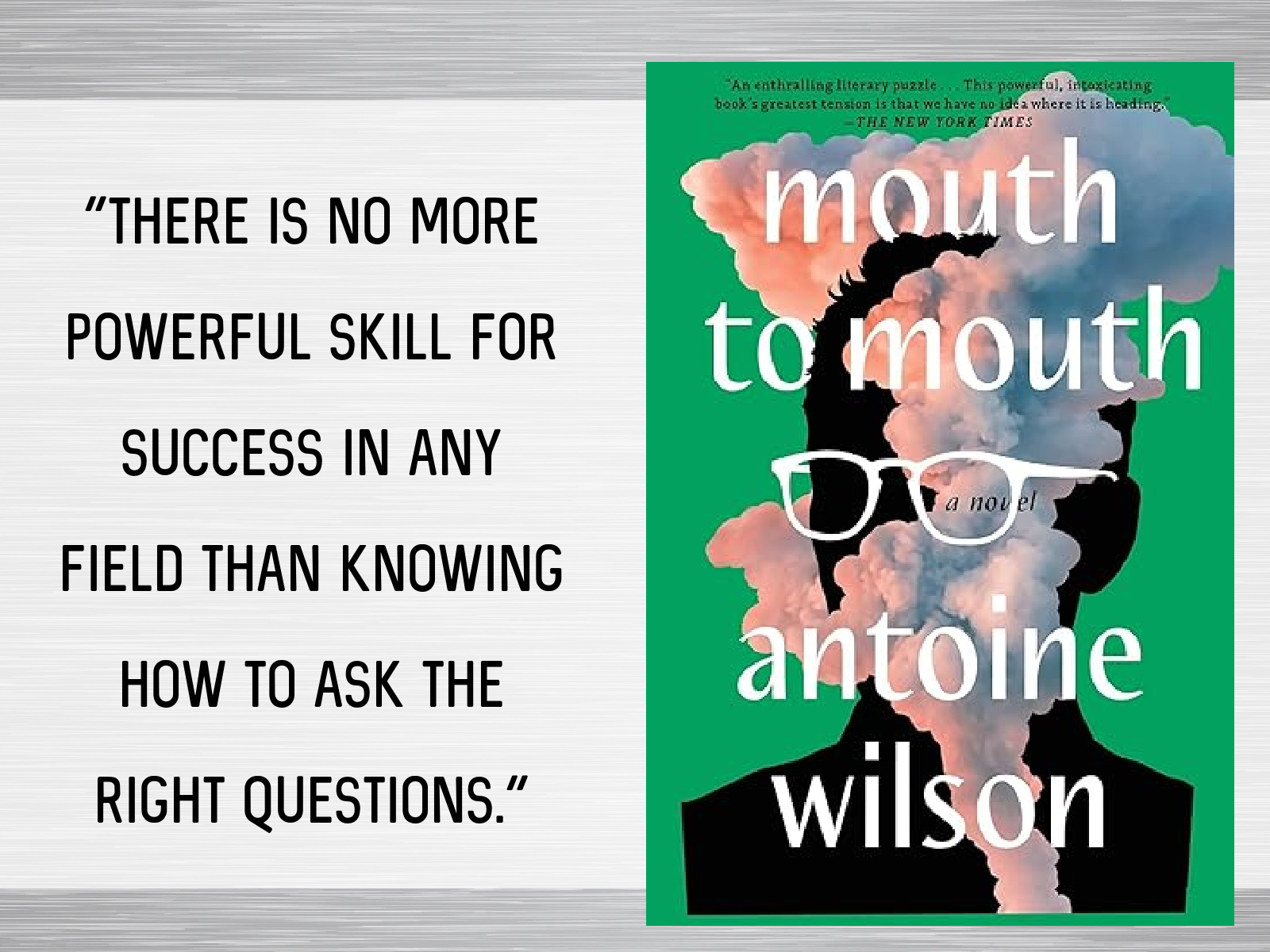
NONFICTION
Five Lies of Our Anti-Christian Age, by Rosaria Butterfield: Our world seems particularly topsy-turvy these days. Some cultural “values” are easy to spot as antithetical to God’s ways, but others are harder to identify as false, and many of these ideas have found their way into prominent contemporary Christian teaching. In this hard-hitting book, Rosaria Butterfield (a former professor of queer theory who once identified as a lesbian and flaming feminist) illuminates five lies currently promoted by culture: 1) homosexuality is normal; 2) being a spiritual person is kinder than being a Biblical Christian; 3) feminism is good for the world and the church; 4) transgenderism is normal; and 5) modesty is an outdated burden that serves male dominance and holds women back.
Butterfield holds nothing back in exposing the lies behind these ideas. While her harshness did not always sit well with me, I admire her conviction and understand the urgency of her message, and I appreciate her refusal to mince words or tiptoe around uncomfortable ideas. Butterfield blends her own story into the narrative, lending credibility to her messaging as she describes the sinful lifestyle she (reluctantly) left to pursue a life following Jesus (she is now a married, homeschooling mother of four); she fully acknowledges that she once espoused every one of these lies, a position that prevents her words from coming across as judgmental or hypocritical. This is more than a personal story: Butterfield makes strong theological arguments for her positions, relying heavily on Scripture in addition to cultural studies and anecdotes.
I was familiar with much of the information here and am also quite passionate about these culturally relevant issues. But I also learned a lot, especially related to the third lie (feminism is good for the world and the church) and the fifth lie relating to the importance of modesty; I realized how I have been listening more to culture than what the Bible has to say about these issues, and though Butterfield’s views are more conservative than mine (verging on legalism to my mind), she helped me to recognize the sinfulness of some of my views and actions, and I was thankful for the call to repentance.
This book is sure to offend many readers, but more importantly it is truthful, God-honoring, and Christ-centric. For those willing to engage with these Biblical ideas it offers hope and flourishing that can only be found through God and His Truth.
My Rating: 4 Stars // Book Format: Audiobook
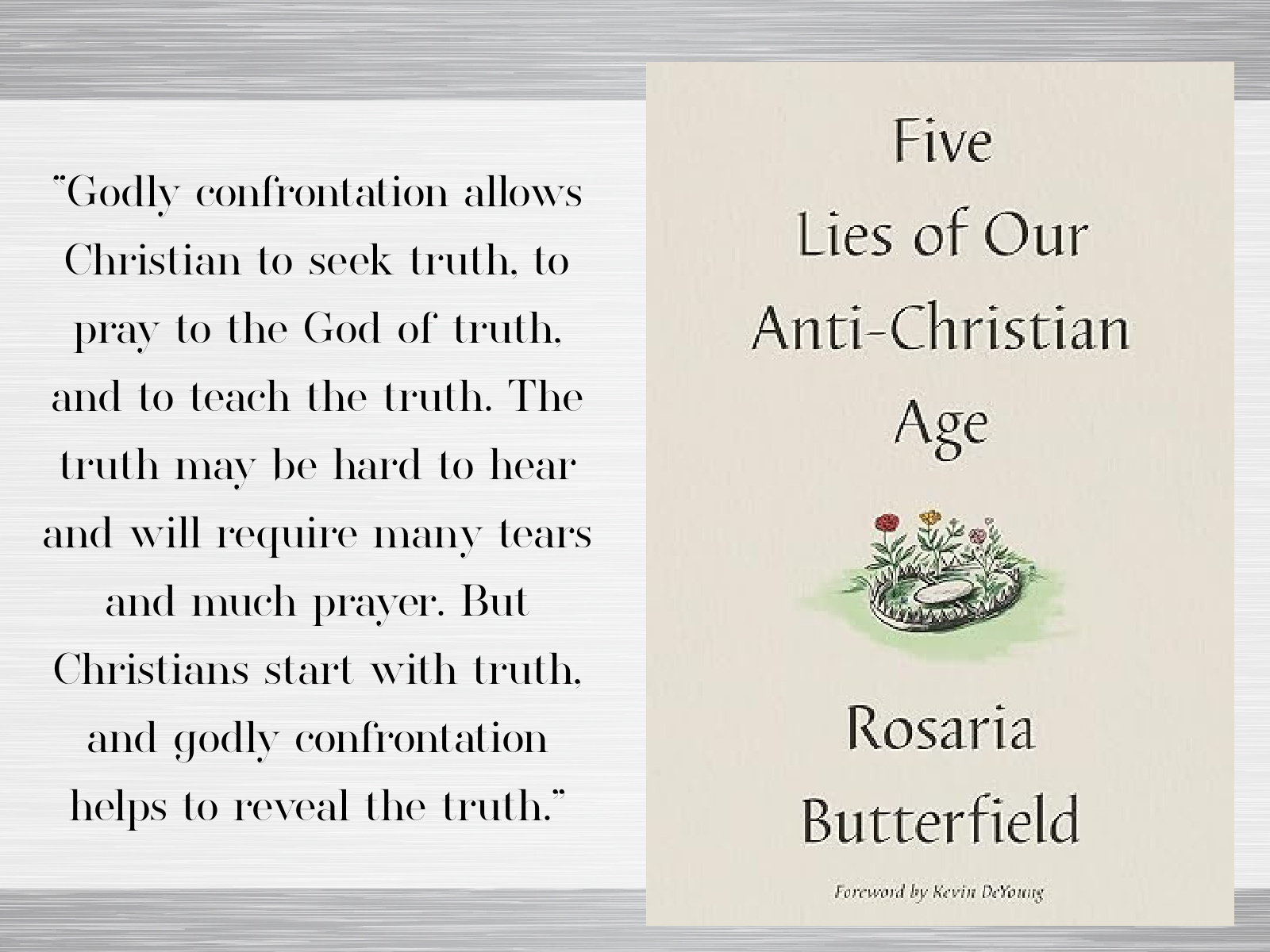
Boomer Brand Winners & Losers: 156 Best & Worst Brands of the 50s and 60s, by Barry Silverstein: The 1950s and 60s were a pivotal time in the world of brand marketing. This Golden Era saw the introduction of countless new foods, shows, musical artists, technologies, and even political ideals. This unique book takes a nostalgic look at the best and worst of the era. In categories on topics such as cereals, car models, toys, and fast food, the author (a retired marketing advisor) offers his take on some of the most memorable and innovative “winning” brands from the period, as well as the unremarkable or truly dreadful “loser” brands. Along the way we get fun insights into how these brands came about, their impact at the time, and the je ne sais quoi that gave some brands staying power while others fell by the wayside.
I’m not a Boomer, but I’m the product of parents from the 50s so this felt nostalgic for me as I grew up listening to 50s music and hearing about the toys and foods and shows of their childhoods. And of course, many of the “winning” brands are still around today, so I had great personal context for the material. Needless to say, this was a lot of fun and gave me a deeper appreciation for the brands in my life today. I could have done without the last few chapters which got into some more political elements (the author offers his opinions on winning and losing ideals and even political candidates) but overall I really enjoyed this—even when I strongly disagreed with some of his judgment calls (The Jetsons will never be a loser in my book!). The quirky jokes were an especially nice touch—the Dad Humor fit right in with the premise! My only wish was that the book had been longer, as I could have gone for much more of this informative book that left me itching to pull on some Mary Janes, jump into my classic Corvette, and drive down to the local Sonic for a Dr. Pepper.
My Rating: 4 Stars // Book Format: Audiobook
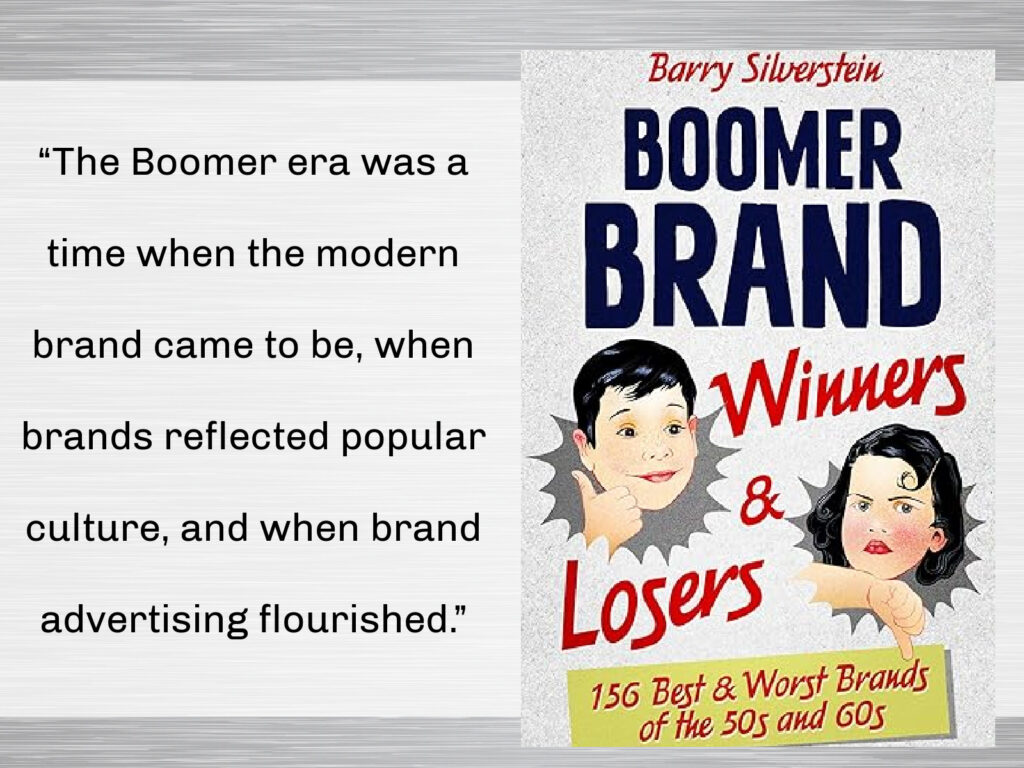
Fairy Tales: The Origins, History, and Interpretations of the World’s Most Famous Fairy Tales, by Gustavo Vázquez-Lozano: Not long ago, I was reading through an anthology of well-known fairy tales with the twins and realized how little I know of the origins of these tales. I was aware of their connections to folklore and familiar with some of the better known authors associated with many of the stories, but I wanted to know more: where did fairy tales come from? How could they be interpreted? How much truth can be found in these stories told mostly to children?
My questions led me on a quest for more information and ultimately to this book. In it, the author explores the origins of some of the more popular tales (including theories as to their historical models) and introduces us to some of the authors credited for transcribing (and sometimes authoring) the fairy tales we know today including the Grimm Brothers, Charles Perrault, and Hans Christian Anderson. We also look at some of the most common interpretations of fairy tales by modern scholars, psychologists, and the original storytellers themselves.
This book provided the broad overview of the fairy tale genre I was seeking. I appreciated the examination of how stories have changed over time, evolving from tales for adults to ones relegated to the children’s section of the library. The explanations of how fairy tales differ from similar genres of mythology, fables, and legends were also helpful, and I learned about some new-to-me fairy tales (such as the horrifying Bluebeard) as well as different versions of some of the most familiar ones. I was quite interested to note the varying flavor and uses of fairy tales from different nations and cultures.
While the content here is solid, there is far too little of it. This seemed more like an extended Wikipedia article then a full book, and with the NUMEROUS grammatical errors, amateur formatting, and disjointed prose that seemed lifted from other sources, I couldn’t help but feel like I was reading a mediocre high school essay and not a published book. Despite this lackluster reading experience, this whet my appetite for more information about the fascinating world of fairy tales. If you have any other resources to recommend, please share!
My Rating: 3 Stars // Book Format: Kindle
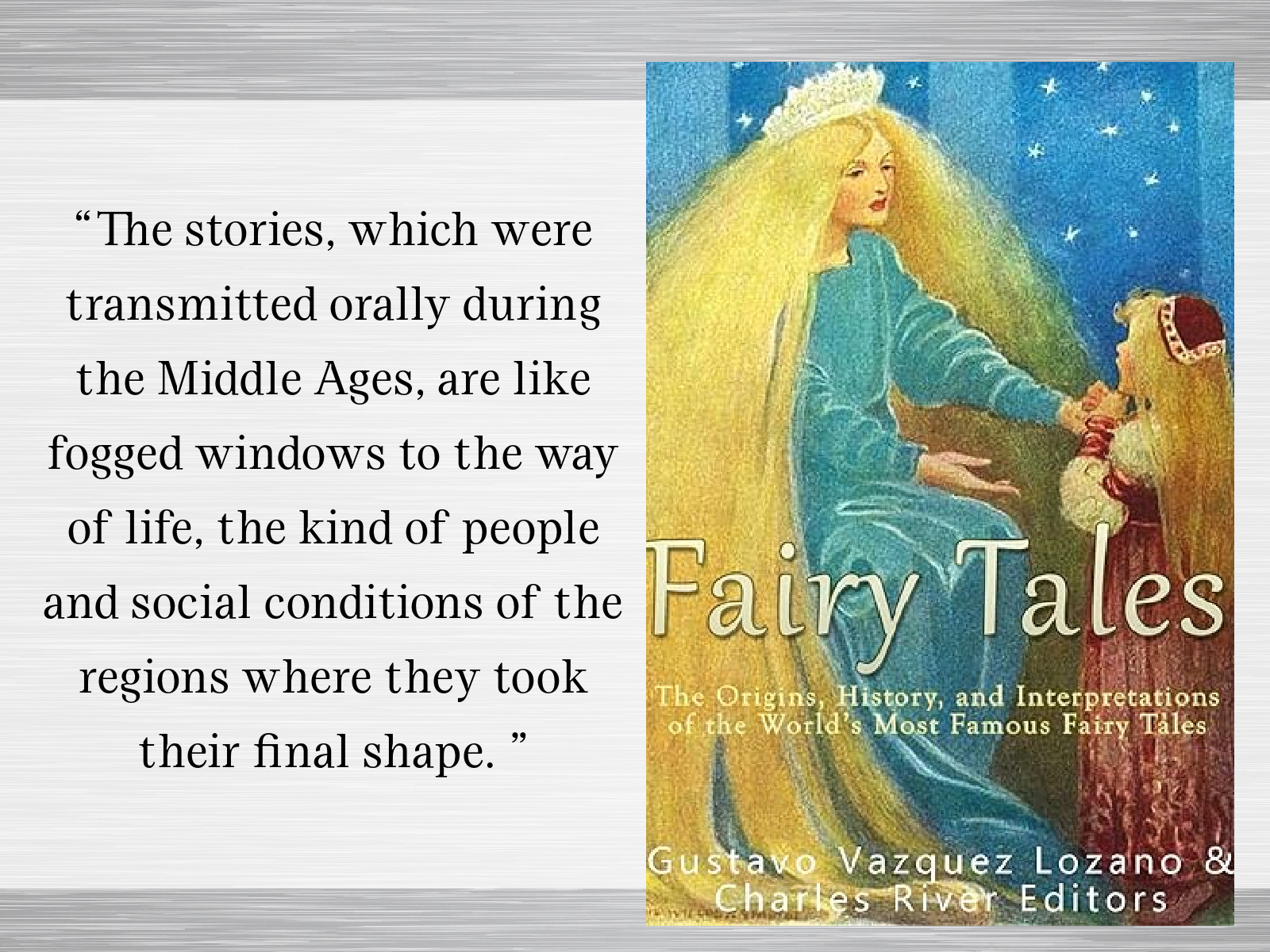
Becoming Free Indeed: My Story of Disentangling Faith from Fear, by Jinger Duggar Vuolo: I’ll preface this review with an admission that I have never watched any of the various shows involving the Duggar Family. I know they are a cultural phenomenon, but other than reports of various Duggar scandals in recent years I knew nothing about them or their family’s story or beliefs until Jinger Duggar began making the rounds on podcasts earlier this year. I was intrigued by her faith trajectory and eager to hear more.
In Becoming Free Indeed, Jinger talks about her upbringing within a very legalistic brand of Christianity (namely the teachings of Bill Gothard, another figure with whom I had no previous familiarity). Jinger loved the Lord and had a genuine desire to glorify God, but Gothard’s teachings led to some very confused ideas about what it meant to be a true follower of Jesus. Jinger obsessed about her clothing choices, the foods she ate, and whether or not she was reading her Bible, praying, confessing, or pursuing courtship perfectly. The rules and practices grew crippling, trapping Jinger in a cage of anxiety and fear. Her eyes were opened to a new way of understanding Jesus and His grace when she began courting her now-husband, whose own vibrant faith was less rules-based and more relational. In subsequent years she has broken away from many of her old ideas about God, disentangling them from what the Bible ACTUALLY says and developing a truer relationship with God that is dependent on what He has done and not what she can do.
I am so inspired by Jinger’s testimony. In a sea of deconstruction stories in which former Christians abandon their faith entirely, it was refreshing and so very encouraging to see someone who has left an (unBiblical) faith practice while holding firmly to God Himself. Jinger’s experiences are an invitation to others who have struggled with legalism to step into freedom, and also to those who have abandoned the churches of their youth to come back to a faith that is less rules-based and more relational.
Those looking for a Duggar tell-all will not find that in this book. Jinger does share aspects of her family story, but this is background for the discussion of the theological ideas at the book’s center. Jinger is respectful towards her parents and siblings, managing to honor her them while also acknowledging their imperfections and differences in understanding God and the Bible. She is also very respectful towards those whose faith journeys have looked different from hers, and shows grace to herself and her old understanding even as she repents of wrong thinking.
This book offers much to ponder and discuss regarding faith backgrounds, the gaps between what we were taught and what we now believe (and how we navigate those discrepancies), spiritual manipulation, and what it REALLY looks like to be free in Christ. It also introduced me to the delightful and remarkable young woman who is Jinger Duggar Vuolo who comes across as wise, strong, and a remarkable light for Christ.
My Rating: 4 Stars // Book Format: Audiobook
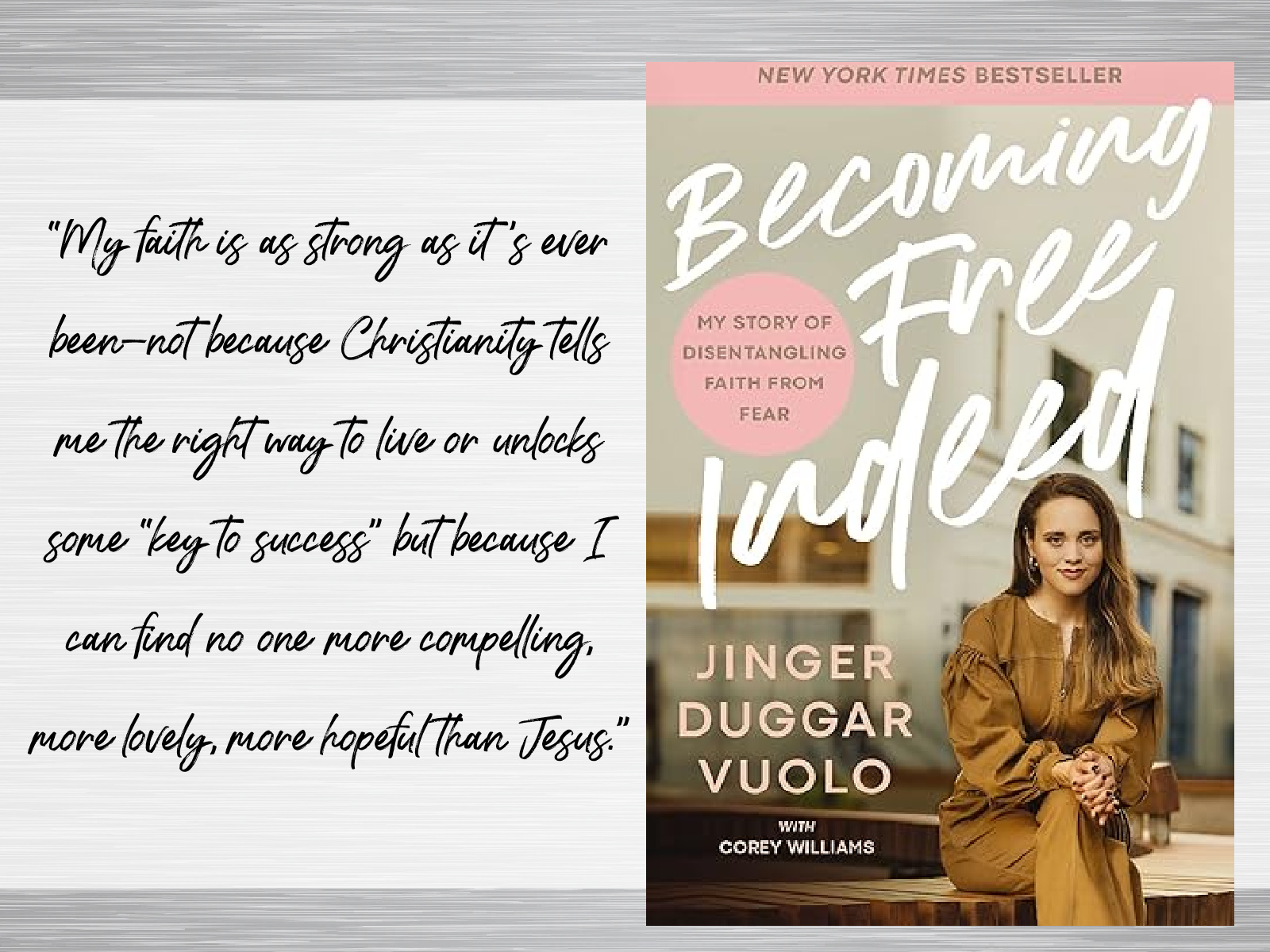
Reading for the Love of God: How to Read as a Spiritual Practice, by Jessica Hooten Wilson: I often describe reading as my favorite hobby and sometimes feel guilty for the time I dedicate to this “unnecessary” endeavor. But Christian scholar Jessica Hooten Wilson believes that reading is more than a pleasurable indulgence reserved for the privileged, but a critical spiritual practice that deepens our faith. And it’s not just reading the Bible or blatantly spiritual books that is spiritual edifying. In this unique book, Wilson shows readers how to reap the benefits of reading which, she argues, can deepen our connection to God, enhance our prayer lives, and teach us to love our neighbors.
Utilizing examples from well-known Christian thinkers from Augustine to Dorothy L. Sayers, Wilson guides us through the act of reading, offering specific approaches and ways of interacting with the text. She examines the history of reading and how our cultural approach to books has changed, and she reminds us of our “identity as word creatures” which, she argues, should make humans (especially Christians) bookish creatures. Perhaps most importantly, she shows that a healthy reading life can improve our ability to read and understand the ultimate book, the Bible.
I enjoyed this blending of literary commentary/analysis and spiritual practice, and I’ll be applying many of these new perspectives to my personal reading. Wilson’s writing is accessible in a subject that could feel elitist or esoteric, and she effortlessly balances academic ideas with application. Especially useful are the book lists at the end that contain many suggestions for high-quality literature for everyone from toddlers on up. I would absolutely love to take a full class on this subject; this book is an excellent taste of what such a course could be like.
My Rating: 4 Stars // Book Format: Audiobook
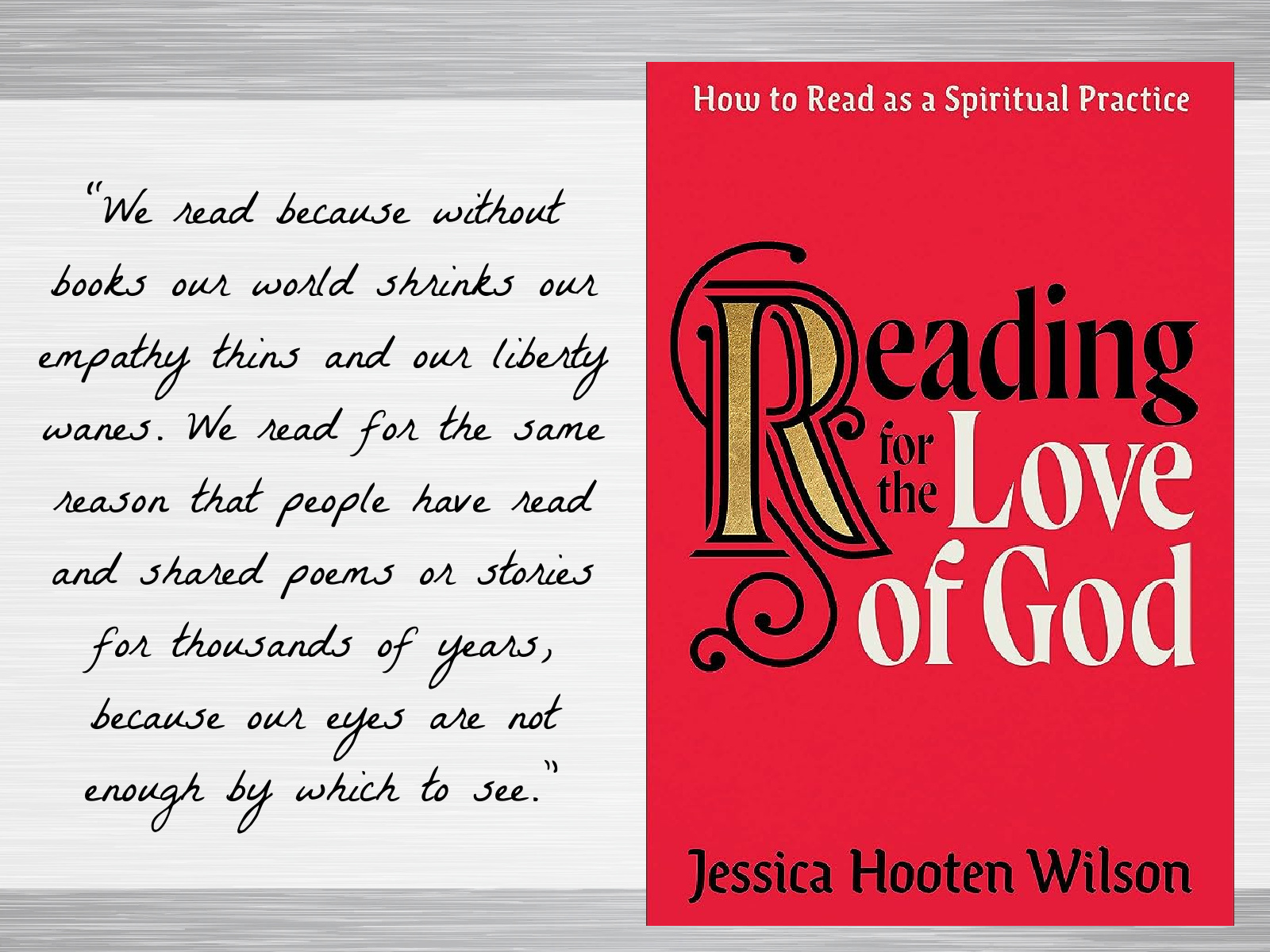
What have you been reading lately? I’d love to hear about your latest books!
I enjoyed The Favor too. A unique perspective on friendship as well as infertility.